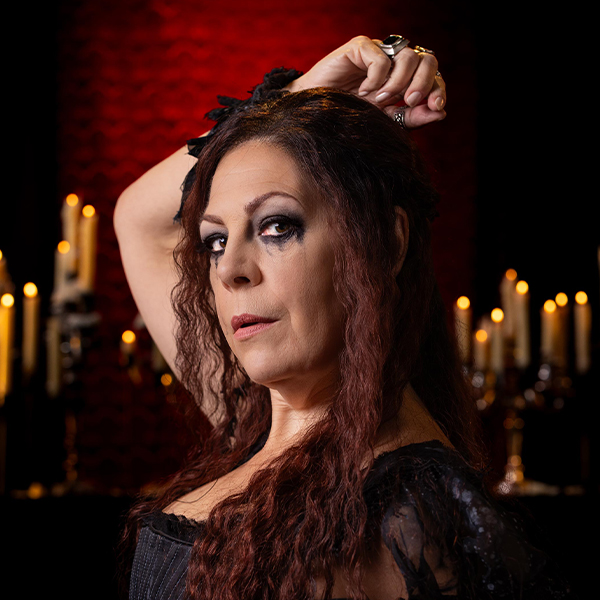April 10, 2025
Sondra Radvanovsky on the thrills of "Medea"
Berwyn-born soprano Sondra Radvonovky has thrilled audiences with her powerful portrayals as some of opera's most dramatic heroines from Norma to Lady Macbeth. This fall she opens Lyric’s 2025/26 Season with Medea. We sat down with her to chat about this thrilling character and how she prepares for such a demanding role. See Sondra take on the tour-de-force title role of Medea, opening on October 11th.
Lyric audiences last saw you as the infamously bloodthirsty Lady Macbeth during the 2021/22 run of Verdi’s Macbeth. Medea is also pretty bloodthirsty. What do you enjoy about playing these really gritty, intense women on stage?
You know, I love the acting challenge. I love the vocal challenge of both of those women. Medea is really such a complex character. She's dark and bloody, and we won’t give away the plot, but there's a lot of blood. But she also is a woman scorned, and a mother who's hurting deeply. I love that complexity, and the way that Director Sir David McVicar really brings that out. She's always on stage lurking, singing, or driving all of the action. And for me, that’s a great acting challenge. Maria Callas said it was one of the greatest roles that she ever sang and portrayed, and I agree with her.
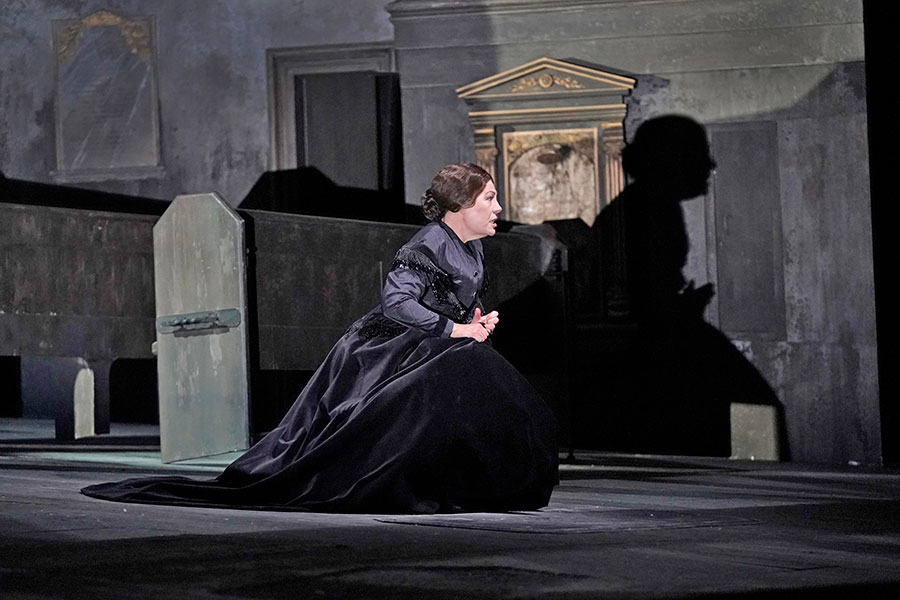
Sondra Radvonovsky delivers a chilling performance as Lady Macbeth in Lyric's 2021/22 production of Macbeth.
They say that hurt people hurt people. In the opera, we don’t get Medea’s entire backstory. How do you think she was led to the moment we see unfold on stage?
There's a great backstory to Medea that we don't see. It involves the Golden Fleece, Jason and the Argonauts, and all of that rich Greek mythology. Medea found this man who she loved so much. She loved him so much that she helped him steal the Golden Fleece. I mean, who does that? Then there were lies and betrayals, and she cut up the body of her brother to throw off her father so that he wouldn’t chase her to this island that we find her at now. Who does that?
This is a woman who is at the end of her rope because she loves this man so much, and she loves her children so much, she would do anything to keep that family unit together. That, to me, is the heart of the story. It's about love and being scorned in love, and that’s a universal feeling. So many of us can relate to that kind of heartbreak.
By the time we meet her in the opera, she has been chased halfway around the world, and across the ocean, to find Jason. And when she does? He's with another woman. And well, you can imagine what happens next.
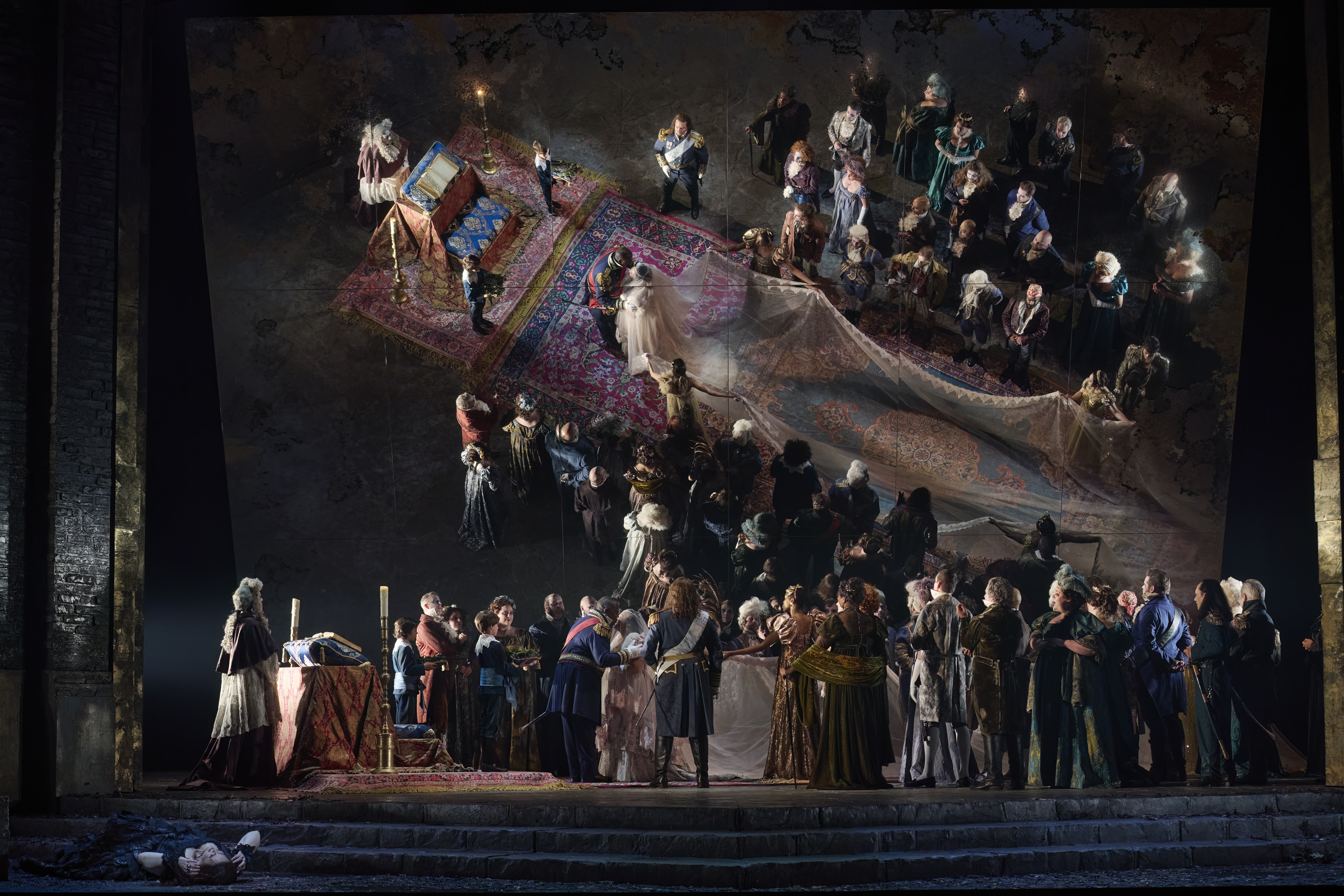
An extravagant scene from Lyric's coproduction of Medea performed at the Canadian Opera Company.
It would be easy to paint Medea as just a woman on a rampage. How do you bring dimension to her character and avoid turning her into a cartoon villain? How do you make the audience feel for her as a fully-realized, complex person?
I find that in any opera I do, not just with the wicked women or the dark women, but with any woman that I play, I try to understand the character’s background and find what makes them human. Yes, I know this is opera, but Medea is based on a character that we think may have lived or at least one deeply rooted in Greek mythology. So I like to find the human side of all the characters that I play. There's definitely a very human side to Medea.
The easy route to go is to lean into her darkness and the ‘I'm going to kill you and I hate you’ side of her. And the more interesting way to play her is to explore her changing feelings and how her emotions change at the drop of a dime. I think the audience can relate to that more because it's more human. It's what we feel. We don't just always feel one emotion. We don't feel rage all the time. We don't feel anger all the time because it's exhausting. We have to have that other side of the coin, which is the soft, gentle side. The most interesting thing for me about Medea is how quickly she flips between those two sides, the dark and the gentle, and how she can just snap. That's a woman at the end of her rope, and that's what makes her so intriguing.
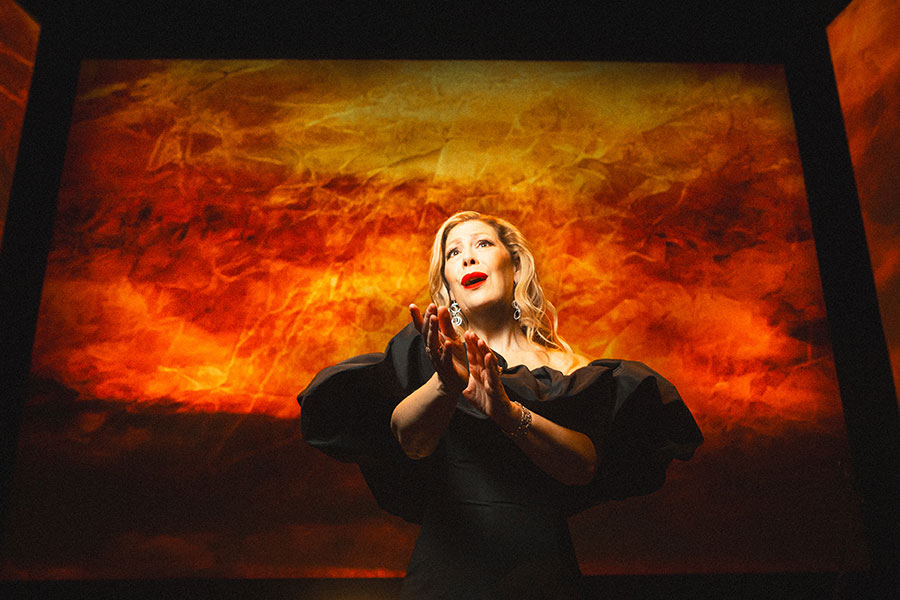
Sondra Radvanovsky brought Puccini’s fiercest heroines to life in The Puccini Heroines this February.
This role is a tour de force, both vocally and emotionally. It pushes every limit and demands everything from a performer. How do you get into character and prepare for a role like Medea?
This production is very physical, and Sir David McVicar has envisioned Medea with this serpentine quality. It really works for me to think of her as a snake that's slithering amongst all the other characters on the stage. She's unlike everyone else and she knows it. So I had to develop my own physical vocabulary just for her.
When I first did this role, that involved learning how to box and doing Pilates to really strengthen my core, because Medea is on the floor a lot and she gets thrown around quite a bit. She's resilient and an incredibly strong woman, and that's the energy I’ll be channeling. I’ve really been working on my core, working on strengthening my body, because I'll be 56 when I do this, and crawling around on stage is harder than it was before. Vocally, Medea is in my voice, it's in my muscle memory. So to me, it's not as hard now doing a role for the second, third, fourth time, because your muscles remember it. Like Norma, it’s a vocal marathon, and she’s on stage most of the time, so you have to learn how to pace yourself. That's where a solid rehearsal period comes in, where I learn how to pace myself not just vocally, but physically as well.
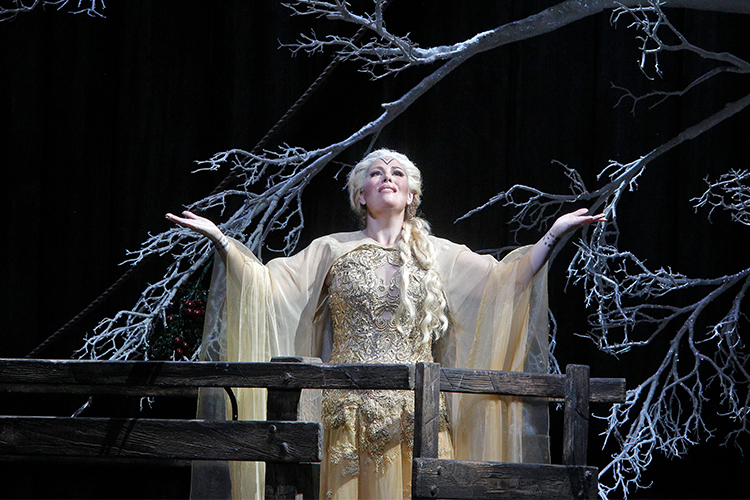
Sondra Radvanovsky stuns as Norma in Lyric's 2016/17 production of Norma.
You just mentioned Norma, a role Lyric audiences have previously seen you perform. There are a lot of similarities you can draw between these two characters. Did that experience shape how you approached Medea, or do you see them as two very different women?
I see similarities to Norma in that she's a mother, a woman who’s been scorned. Their love interest is in love with another person. And those men are very weak characters and can be manipulated very much, both by Norma and by Medea. Sadly, Medea takes things another step further than Norma does, but at their core both women are truly at the end of their rope. They don't know what to do, so they lash out at society, at the world, and at the people whom they love the most, their children.
For someone who has never seen Medea, or even someone who is a longtime fan, why is this production a must-see?
This is absolutely one you need to see. I don’t know how else to say it. This production in particular is something special. The music is stunning and beautifully written, with recitatives that really help you understand who the characters are. The set, the costumes, and the entire story itself feels incredibly contemporary and relatable. Even though this is based on an ancient Greek myth, the way it's portrayed on the stage feels strikingly modern and relevant. Truly, you will be surprised at how quickly the time flies when you see Medea, because both the story and this production in particular are riveting, and the music just slaps you in the face. It's so beautiful.
This production is led by Lyric’s music director, Enrique Mazzola. Can you share a bit about your experience collaborating with him?
This will be Enrique’s first time conducting Medea. We’ve spent a lot of time talking about it and picking it apart, and exploring its meaning. He has such a feel for this music. It's really in his blood, being Italian, and he has such a close relationship to the text, because this opera really is about storytelling. It’s not only about telling Medea's story but also telling the stories of everyone who orbits around her.
Enrique is so wonderful with all of that text. We're asking ourselves, why is she saying this? Why is she saying that? What is the musical meaning of this? Why does the orchestra respond in that way? Why do I move on stage at that specific moment? He's so down to the nuances. And that is what you need with a conductor with a piece like this. Not somebody just conducting the music, but somebody who's taken it apart and looked at every aspect of the opera. And that's what Enrique has done and will be doing.
I'm so excited to be sharing this production with him because this opera, more than any other opera I have done, is a collaboration of the music and the story together. One cannot exist without the other, and Enrique understands that at his core. He is such a great collaborator, an incredible musician, and such a wonderful storyteller himself.
Medea opens Lyric's 2025/26 Season on Saturday, October 11. Learn more and get your tickets for the Lyric premiere of Cherubini’s intense drama at Lyricopera.org/Medea.

